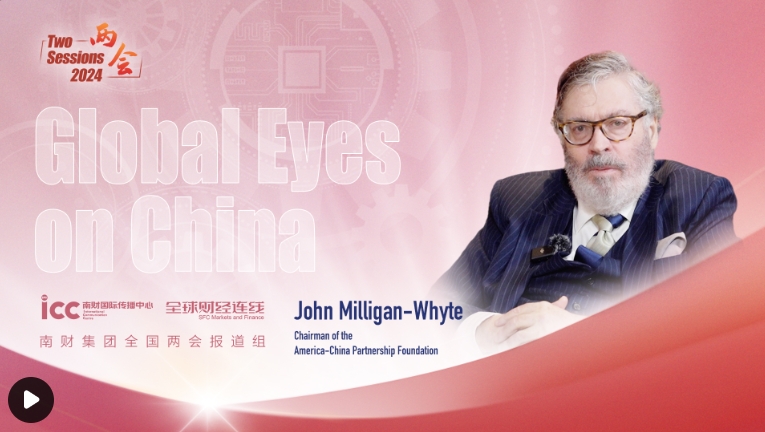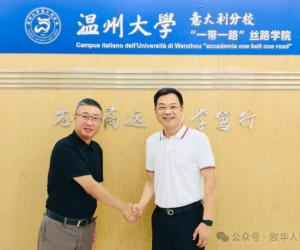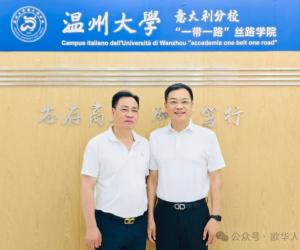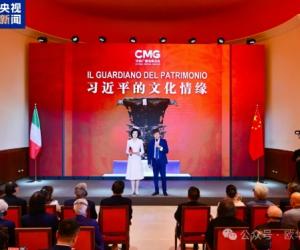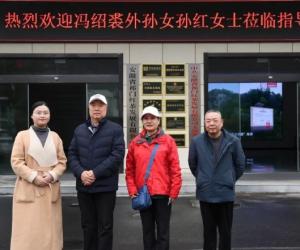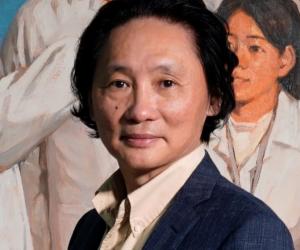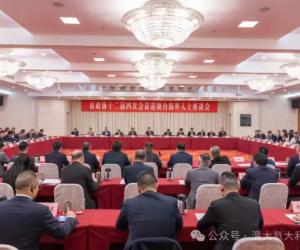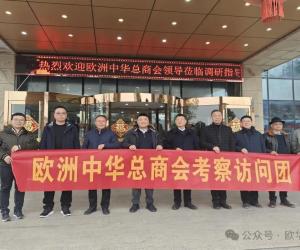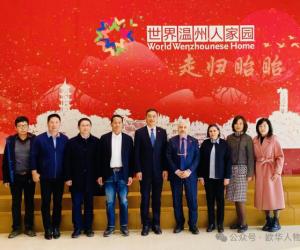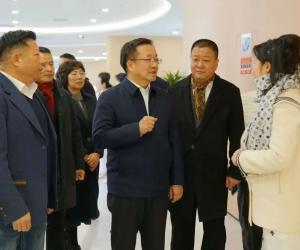John Milligan-Whyte: Two Sessions show a responsible national government
“It is, as I said, one of the most responsible and effective governments that I'm aware of,” said John Milligan-Whyte, Chairman of the America-China Partnership Foundation who shed light on Chinese modernization and China's whole-process democracy in an exclusive interview with SFC journalist.
Whyte considers the Two Sessions to serve as a platform for the national government to communicate its policies and direction to the country, while also providing an opportunity for over 30 districts in China to convey their perspectives and thoughts to the national government. “You do not have a limited-process democracy, but a whole-process democracy,” he emphasized the advantage of the Chinese democracy.
While comparing the Guangdong-Hong Kong-Macao Greater Bay Area to other world-class bay areas, Whyte states that “what's going on in the Greater Bay Area is an example of how China is creating something that is far more powerful than Silicon Valley, or the other centers for venture capital” by attracting more and more talents and advancing in technology development areas.
China will have spectacular growth with high-quality development in the economy
SFC Markets and Finance: To start with, you have a long friendship with China, what notable developments and changes have you observed along the way?
John Milligan-Whyte: The thing that I find most fascinating about China is how it is different from America in a very positive way. In America, capitalism controls politics and public policy. In China, socialism controls capitalism, politics, and public policy. In addition, China's government is able to undertake long-term economic planning, and quickly take advantage of opportunities to improve the lives of Chinese people. And its achievements in lifting 800 million people out of low productivity into higher productivity urban work within one lifetime has never been equaled in human history. And I find this inspiring. When I look at what's going on in the Western countries, I see chaos while China gives me a certain comfort, that there's a new form of modernization that is far better for the developing world than the Western forms of modernization.
SFC Markets and Finance: If we look at numbers, China achieved 5.2% GDP growth in 2023. What's your prospect for China's economy going forward? And what role do you envision China playing in the global economy?
John Milligan-Whyte: The government has decided that quality growth is better than quantity growth, and it's dealing with the aftermath of the COVID and tension with America. I'm quite sure it will achieve greater than 5% growth this year. And I'm very, very confident that it will have a spectacular growth in the high-quality growth in the future.
SFC Markets and Finance: How does this approach benefit China's economy?
John Milligan-Whyte: China, out of 1.4 billion people, has produced a unique form of effective government. And the governing party has done is looked out over the next 30 years, and structure economic planning that is, in my opinion, phenomenal in what it is focused on and what it's going to achieve. In the West, we tend to underestimate China, we still underestimate it. But for 38 of the last 40 centuries, it has been the largest economy in the world and the most technologically advanced. So what is being done by the Chinese government is they have positioned China to lead in the new tech industries that are going to shape economic growth and productivity in the future. And this has been overlooked by other countries in the West, who don't recognize what's going on in China.
The Two Sessions demonstrate exceptional governance of the national government
SFC Markets and Finance: The Two Sessions, China's important political meetings is happening right now. How do you see the significance of China's Two Sessions? And what areas and topics are you more focused on?
John Milligan-Whyte: China has an extraordinary government. It reminds me of a book written by the Greek philosopher Plato two thousand and three hundred years ago, where you have a group of people who are selected to lead because of their merits. Now, in China, the CPC and the NPC, and the CPPCC, what is not recognized in the West is that there are three what we call continuous feedback loops. Now these feedback loops within the 95 million members of the party, and among the 3000 members of the NPC, and the CPPCC, provide a form of guidance for the Chinese government that has, in my opinion, produce the most responsible and effective government that I'm aware of. You asked me what I'm looking for in the Two Sessions. In the Two Sessions, I'm looking at high tech. As I said, China leads in seven of the eight areas that are going to control the future economy. And it leads in 27 of the 34 research areas in those industries. So I'm going to look at how the government is spending 7% or 8% per year on this type of development, it leads the world in research development. Only a think tank in Australia began to realize what was going on. But the West simply assumes that China is not going to be as good as the West. So they're asleep.
SFC Markets and Finance: We know that the Two Sessions mechanism is also seen as an important demonstration of Chinese-style democracy. So how does that differ from the Western style?
John Milligan-Whyte: In America, for example, America was designed by the people that wrote its constitution 250 years ago to be essentially ruled by wealthy people. And because of the way elections occur, where you have elections every 2, 4, and 6 years, the reality is that only less than 1% of the very wealthy control the public policy. This is producing a disappearing middle class, and a very angry working class, to the point where the stability of the American form of government and therefore the viability of its economy are in serious and obvious danger.
In China, there is the whole-process people’s democracy. So in America, you have a limited, everybody votes but their votes really don't control anything. Society is controlled by the very, very wealthy. In China, you have not a limited-process democracy, you have a whole-process democracy. So within the CPC, which I call China's guardian party, because it's similar to the guardians that ruled in Plato's ideal state. In his book, The Republic, two thousand three hundred years ago, the Guardians provide the executive sort of leadership.
The Two Sessions basically inform the country of what the thinking is of the national government. And at the same time, inform the national government, what the thinking is in over 30 districts in China. And it is, as I said, one of the most responsible and effective governments that I'm aware of.
The idea of socialism is that government should benefit all
SFC Markets and Finance: As you mentioned earlier, we know China also emphasizes the China's path to modernization. What's your view on that? And what's the uniqueness about it?
John Milligan-Whyte: It's very inspirational. As they said, the fascinating thing about China is that unlike Europe and America where capitalism controls politics, and therefore public policy outcomes. In China, because of its history, and the way it was formed, socialism controls capitalism and politics and public policy. So the idea in socialism is that government should benefit everybody. Lifting 800 million people out of poverty and 400 million of those go into high productivity jobs, is unequaled in any Western country in its size and scale, and the importance globally. It was thought, certainly in the West, which has dominated modernization for the past 400 years, that in order to create economic success, you would have to have a government that is controlled by capitalism. China's got four times the population of the United States and its economy is going to be many times larger than the American economy or the European economies. So not only it has proven that socialism can create economic development and social stability, it is actively helping all the other developing countries and the developed countries with its Belt and Road (Initiative), its AIIB, its New Development Bank, BRICS, etc. It's really creating the new framework for how the world works.
SFC Markets and Finance: China is actively promoting its openness to foreign investment. What do you think this will bring not only to China but what benefits will it bring to the world as a whole?
John Milligan-Whyte: The government has given Western global banks now the ability to be fully operational in China. And that creates some competition for the local wealth management industry, and the wealth management industry in China is going to be the largest in the world. Now, the government is emphasizing particularly as well as those symbols of financial opportunities for foreign banks, limited financial opportunities. It also said, we welcome investment in healthcare, we welcome investment in eldercare, we welcome investment in e-commerce and digital commerce, to provide an example for Chinese businesses to study and improve. Not only improve their own performance merely but to improve the performance of the leading foreign businesses. And an example would be in electronic vehicles. China's become the biggest producer of cars in the world. This is the leadership that China's form of modernization is providing that is unique.
The GBA is growing to surpass other tech and finance hubs
SFC Markets and Finance: As an economically developed region, how is the Guangdong-Hong Kong-Macao Greater Bay Area's performance in terms of technological innovation and talent attraction?
John Milligan-Whyte: What's happening now is the Chinese that went abroad to foreign universities, the trend now is instead of staying more are coming back than staying abroad. And they're doing that because China is in its history, it is so inspiring, and offers so many opportunities. So the Chinese government has taken advantage of that. So you have a tremendous capturing of intellectual capital.
In addition, you have Eric Schmidt, who was the head of Google and advises the U.S. government said that it's hard for the Europe and America to compete with China in high tech, because, quote, ‘there are just too many smart people in China’.
So what's going on in the Greater Bay Area is an example of how China is creating something that is far more powerful than Silicon Valley, or the other centers for venture capital, which takes advantage of the government's ability to do long-term economic planning, and takes advantage of the tremendous intelligence in the 1.4 billion Chinese which are about 18% of the world population, and the huge market that China has. So Guangdong will surpass Silicon Valley in what it produces in the future.
SFC Markets and Finance: Going off with what you just said, if we compared GBA with the three world-class bay areas of New York, San Francisco and Tokyo, what's the advantage and uniqueness of the GBA?
John Milligan-Whyte: Basically, San Francisco is in serious trouble, because its social infrastructure is in crisis. New York is really not innovative. It's not technology finance, it's just speculative finance. And Japan because it took advice during the Asian financial crisis from the IMF and World Bank, it's really been crippled economically. And it's also a very closed society. Now, one of the huge advantages that China has, there are only about 100 million people in Japan, there are only 330 million people in the U.S., there's four times of that number of people in China, that creates not only more intelligent people, but also creates a larger market. And unlike the U.S. or Tokyo, China's government has the ability to formulate, implement, and reform long-term economic planning. Nowhere else in the world is that the case, and it provides future growth for China that is going to shock and surprise the world.
SFC Markets and Finance: Through what channels can China and the U.S. further build its relations?
John Milligan-Whyte: I think it will take two or three generations, for the Americans to cope with the fact that China is going to have the largest economy in the world. There are lots of young people who see what's happening with AI, see what's happening with China, who are trying to figure out, young people in the West, how is this going to affect me?
So what's the America-China Partnership Foundation struggles to do is to present unless the economic growth and the national security of the two largest economies can be sufficiently more aligned than they currently are, the global economy doesn't work. And the American government can't really formulate a long-term policy to deal with China.



